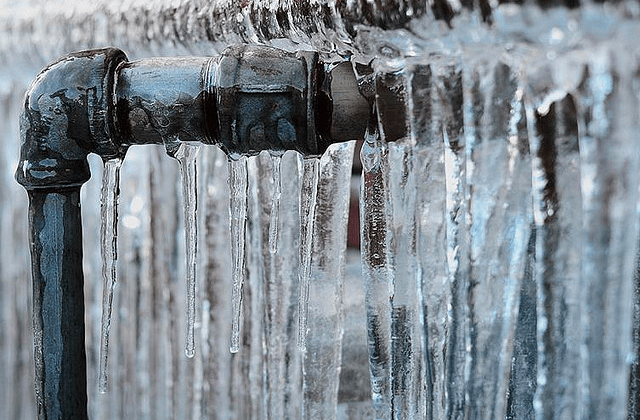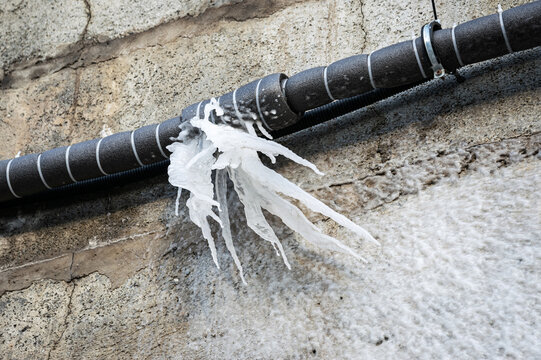We have unearthed this great article on How to prepare your home plumbing for winter weather directly below on the net and concluded it made perfect sense to talk about it with you over here.

Cold weather can wreak havoc on your plumbing, particularly by freezing pipelines. Below's exactly how to avoid it from occurring and what to do if it does.
Introduction
As temperature levels drop, the threat of icy pipes increases, possibly causing costly repairs and water damages. Comprehending how to prevent icy pipes is critical for house owners in cold environments.
Understanding Frozen Pipes
What triggers pipes to freeze?
Pipelines ice up when exposed to temperatures below 32 ° F (0 ° C) for expanded durations. As water inside the pipes freezes, it increases, putting pressure on the pipeline walls and potentially creating them to burst.
Dangers and problems
Icy pipes can cause supply of water disturbances, home damages, and expensive repair work. Ruptured pipelines can flooding homes and create extensive architectural damages.
Indicators of Frozen Pipes
Identifying frozen pipes early can prevent them from rupturing.
Exactly how to determine frozen pipes
Search for lowered water circulation from taps, uncommon odors or noises from pipes, and noticeable frost on revealed pipelines.
Avoidance Tips
Protecting susceptible pipes
Wrap pipes in insulation sleeves or make use of warmth tape to secure them from freezing temperatures. Focus on pipelines in unheated or outside areas of the home.
Home heating methods
Keep indoor areas appropriately heated up, especially locations with plumbing. Open up cupboard doors to allow cozy air to circulate around pipelines under sinks.
Safeguarding Exterior Plumbing
Garden tubes and outdoor taps
Disconnect and drain pipes yard hose pipes prior to winter season. Mount frost-proof spigots or cover outside taps with insulated caps.
What to Do If Your Pipes Freeze
Immediate activities to take
If you suspect frozen pipelines, maintain taps open to relieve stress as the ice thaws. Utilize a hairdryer or towels taken in hot water to thaw pipelines gradually.
Long-Term Solutions
Structural adjustments
Think about rerouting pipelines away from exterior wall surfaces or unheated locations. Include extra insulation to attics, basements, and crawl spaces.
Updating insulation
Buy top quality insulation for pipes, attics, and walls. Appropriate insulation assists preserve regular temperature levels and lowers the threat of icy pipelines.
Verdict
Stopping icy pipes needs positive steps and quick responses. By understanding the reasons, indicators, and safety nets, house owners can shield their pipes during cold weather.
Helpful Tips to Prevent Frozen Pipes this Winter
UNDERSTANDING THE BASICS: WHY PIPES FREEZE AND WHY IT’S A PROBLEM
Water freezing inside pipes is common during the winter months, but understanding why pipes freeze, and the potential problems it can cause is crucial in preventing such incidents. This section will delve into the basics of why pipes freeze and the associated problems that may arise.
THE SCIENCE BEHIND FROZEN PIPES
When water reaches freezing temperatures, it undergoes a physical transformation and solidifies into ice. This expansion of water as it freezes is the primary reason pipes can burst. As the water inside the pipe freezes, it expands, creating immense pressure on the walls. If the pressure becomes too great, the pipe can crack or rupture, leading to leaks and water damage.
FACTORS THAT CONTRIBUTE TO PIPE FREEZING
Low Temperatures: Extremely cold weather, especially below freezing, increases the risk of pipes freezing. Uninsulated or Poorly Insulated Pipes: Pipes located in unheated areas, such as basements, crawl spaces, or attics, are more prone to freezing. Insufficient insulation or lack of insulation altogether exacerbates the problem. Exterior Wall Exposure: Pipes running along exterior walls are susceptible to freezing as they encounter colder temperatures outside. Lack of Heating or Temperature Regulation: Inadequate heating or inconsistent temperature control in your home can contribute to frozen pipes. PROBLEMS CAUSED BY FROZEN PIPES
- Pipe Bursting: As mentioned earlier, the expansion of water as it freezes can cause pipes to burst, resulting in significant water damage.
- Water Damage: When pipes burst, it can lead to flooding and water damage to your property, including walls, ceilings, flooring, and personal belongings.
- Structural Damage: Prolonged exposure to water from burst pipes can compromise the structural integrity of your home, leading to costly repairs.
- Mold and Mildew Growth: Excess moisture from water damage can create a favorable environment for mold and mildew growth, posing health risks to occupants.
- Disrupted Water Supply: Frozen pipes can also result in a complete or partial loss of water supply until the issue is resolved.
WHY CERTAIN PIPES ARE MORE PRONE TO FREEZING
- Location: Pipes located in unheated or poorly insulated areas, such as basements, crawl spaces, attics, or exterior walls, are at higher risk of freezing.
- Exterior Pipes: Outdoor pipes, such as those used for irrigation or exposed plumbing, are particularly vulnerable to freezing as they are directly exposed to the elements.
- Supply Lines: Pipes that carry water from the main water supply into your home, including the main water line, are critical to protect as freezing in these lines can affect your entire plumbing system.
- Underground Pipes: Pipes buried underground, such as those connected to sprinkler systems or outdoor faucets, can be susceptible to freezing if not properly insulated.
https://busybusy.com/blog/helpful-tips-to-prevent-frozen-pipes-this-winter/

I discovered that write up on Helpful Tips to Prevent Frozen Pipes this Winter when surfing around the search engines. If you liked our article if you please remember to share it. Thank you for your time. Please check up our blog back soon.
Book Appointment Now